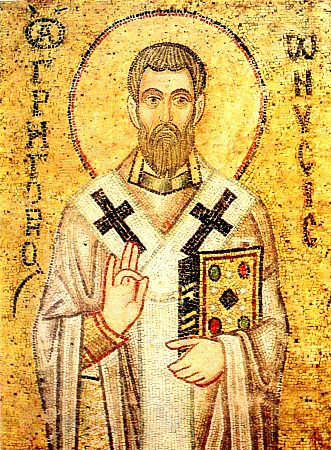人物
Ross (2014)によれば、「ニュッサのグレゴリオス」とは...
ニュッサのグレゴリオスの「キリストの聖なる復活」において、復活について「元素」を用いた説明をしていて...
これを、Epstein (2021)によれば、ロシア宇宙主義者セミョーノヴァが引用して、そこで、フョードロフとは整合しない記述をしている。
Ross (2014)によれば、「ニュッサのグレゴリオス」とは...
Gregory of Nyssa spent his life in Cappadocia, a region in central Asia Minor. He was the most philosophically adept of the three so-called Cappadocians, who included brother Basil the Great and friend Gregory of Nazianzus. Together, the Cappadocians are credited with defining Christian orthodoxy in the Eastern Roman Empire, as Augustine (354—430 C.E.) was to do in the West. Gregory was a highly original thinker, drawing inspiration from the pagan Greek philosophical schools, as well as from the Jewish and Eastern Christian traditions, and formulating an original synthesis that was to influence later Byzantine, and possibly even modern European, thought. A central idea in Gregory’s writing is the distinction between the transcendent nature and immanent energies of God, and much of his thought is a working out of the implications of that idea in other areas–notably, the world, humanity, history, knowledge, and virtue. This leads him to expand the nature-energies distinction into a general cosmological principle, to apply it particularly to human nature, which he conceives as having been created in God’s image, and to rear a theory of unending intellectual and moral perfectibility on the premise that the purpose of human life is literally to become like the infinite nature of God.
ニュッサのグレゴリオス、小アジア中央部のカッパドキアで生涯を過ごした。彼は、兄のカイサリアのバシレイオスと友人のナジアンゾスのグレゴリウスを含む、いわゆるカッパドキアの三教父の中で最も哲学に熟達してした。カッパドキア人は、アウグスティヌス (354-430) が西欧でそうであったように、東ローマ帝国におけるキリスト教の正統性を定義したと考えられている。グレゴリオスは非常に独創的な思想家であり、異教のギリシャ哲学学派やユダヤ教と東方キリスト教の伝統からインスピレーションを得て、後のビザンティン、そしておそらくは現代ヨーロッパの思想にさえ影響を与えることになる独自の統合を定式化した。グレゴリオスの著作における中心的な考え方は、神の超越的な性質と内在するエネルギーとの区別であり、その思想の多くは、他の領域、特に世界、人類、歴史、知識、美徳の領域におけるその考え方の影響を活用したものである。これにより、彼は自然とエネルギーの区別を一般的な宇宙原理に拡張し、それを特に神の似姿に創造されたと考えている人間の本性に適用し、「人間の人生の目的は文字通り、神の無限の性質のようになることだ」というな前提に基づいて終わりのない知的および道徳的完全性の理論を立ち上げるようになった。

[ Donald L. Ross: "Gregory of Nyssa (c. 335—c. 395 C.E.)" on IEP, 2014/07/11 ]
ニュッサのグレゴリオスの「キリストの聖なる復活」において、復活について「元素」を用いた説明をしていて...
Перестанем же не верить изменениям и обновлениям: ибо жизнь растений, животных и самих людей даже научает нас, что рождающееся и подверженное тлению беспрерывно изменяется и преобразуется. Некоторые, правда, упорно отвергают воскресение на том основании, будто тела наши по смерти совершенно уничтожаются. Но дело обстоит далеко не так: тела наши только разрушаются на составные части свои, остающиеся в воде, воздухе, огне, земле. Если же главные стихии остаются и неизменно хранят вверенные им частицы, то некогда Сотворившему из ничего всю вселенную ужели трудно будет воссоздать из уцелевших начал природу нашу..
変化や再生を信じないのはやめよう。植物、動物、そして人間自身の命そのものが、生まれて朽ちていくものは常に変化し、変容しているということさえ教えてくれるからだ。しかし、我々の体は死後完全に破壊されるという理由で、復活を頑なに拒否する人もいる。しかし、これは決して事実ではない。我々の体はその構成部分だけが破壊され、それらは水、空気、火、土の中に残る。もし主要な元素が残り、それらに託された粒子が常に保存されているとしたら、かつて宇宙全体を無から創造した者が、生き残った原理から我々の性質を再創造することは本当に困難になるだろうか...
[ Свт. Григорий Нисский: "Светлое Христово Воскресение(ニュッサのグレゴリオス: "キリストの聖なる復活) " ]
これを、Epstein (2021)によれば、ロシア宇宙主義者セミョーノヴァが引用して、そこで、フョードロフとは整合しない記述をしている。
For example, she cites from Gregory of Nyssa (335–395): “It is not improbable that this simple and non-complex nature [the soul] abides in each of [the body’s] particles after its disintegration” (Nikolai Fedorov 215). This means that, however dispersed one’s bodily particles become after death, they are still related, like family members who might well achieve a reunion through the act of resurrection. In attempting this, there is no need to strive to gather every atom proper to its original body, as the magnetism of the soul in effect keeps them together even at the distance. Certainly this presupposes the existence of souls that have their own free will, which aligns with the Church belief expounded by Gregory of Nyssa. However, this idea seems incompatible with Fedorov’s project, wherein the initiative of resurrection belongs not to the souls of the deceased, but to the determination of their progeny.
たとえば、彼女はニッサのグレゴリウス (335-395) の言葉を引用している「この単純で複雑ではない性質 [魂] が、崩壊した後も [身体の] 粒子のそれぞれに存在することはありえないことではない」 (Nikolai Fedorov 215) 。 これは、死後に人の身体の粒子がどんなに分散しても、復活という行為を通じて再会を果たせるかもしれない家族のように、それらは依然として関連していることを意味する。これを試みる際に、元の体に固有のすべての原子を集めようと努力する必要はない。魂の磁力によって、離れていても事実上それらの原子が一緒に保たれる。確かに、これは独自の自由意志を持つ魂の存在を前提としており、これはニッサのグレゴリウスが説明した教会の信念と合致する。しかし、この考えは、復活の主導権が死者の魂ではなく子孫の決定にあるというフョードロフのプロジェクトとは相容れないように思われる。
[ Mikhail Epstein (Emory University): "Svetlana Semenova (1941–2014)" on "Filosofia: An Encyclopedia of Russian Thought" (2021) ]


コメントをかく